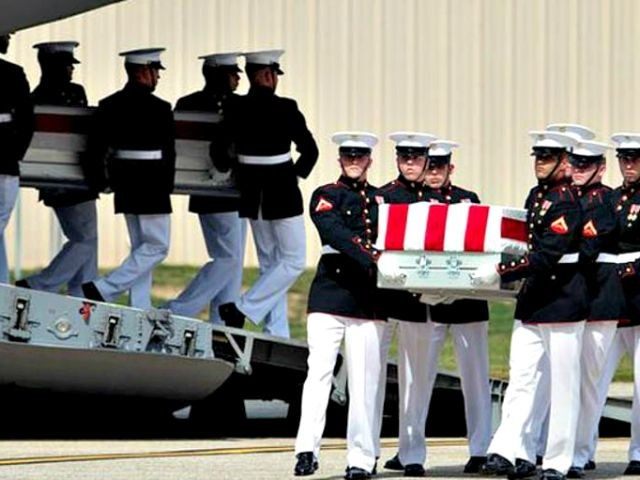WASHINGTON (AP) — A diplomatic security agent testified Monday that after militants stormed the U.S. diplomatic compound in Benghazi, Libya, he turned to U.S. Ambassador Chris Stevens, who was hiding in a safe room, and said, “When I die, you need to pick up my gun and keep fighting.”
Agent Scott Wickland was the government’s first witness in a trial of Ahmed Abu Khattala, a Libyan suspected of orchestrating the attack that killed the ambassador and three other Americans. Wickland took the stand and gave a harrowing account of how he tried without success to save the ambassador and Sean Patrick Smith, a State Department information management officer.
The smoke from weapons’ fire and explosions was so thick and black that it blinded the three. They dropped to the floor and crawled on their bellies, gasping for air. Wickland said he was trying to lead them to a bathroom where he could close the door and open a window.
“I was breathing through the last centimeter of air on the ground,” Wickland said. “I’m yelling, ‘Come on. We can make it. We’re going to the bathroom.’ Within 8 meters, they disappeared.”
Wickland kept yelling for them. He was feeling around on the floor through the toxic smoke, which made the lighted room darker than night.
“To this day, I don’t even know where they went. I was right next to them, and then that’s it,” Wickland said. “I had my hand on Ambassador Stevens. I could hear Sean shuffling.”
Twelve jurors and three alternates assembled for the opening day of one of the most significant terrorism prosecutions in recent years. Abu Khattala is being tried in U.S. District Court, a civilian court, at a time when the Trump administration has said terror suspects are better sent to the military prison at Guantanamo Bay, Cuba.
During Wickland’s testimony, Abu Khattala hung an arm over his chair and held his chin, covered in a long, grayish white beard. He listened through earphones to an Arabic translation of the proceedings.
The opening testimony was aimed at turning the jury against the defendant, but his name was never mentioned throughout Wickland’s nearly three hours on the stand. He is expected to retake the stand on Tuesday.
An 18-count indictment against Abu Khattala arises from a burst of violence that began the night of Sept. 11, 2012. Stevens and Smith were killed in the first attack at the U.S. mission. Nearly eight hours later, two more Americans, contract security officers Tyrone Woods and Glen Doherty, died in a mortar attack on a CIA complex nearby
Abu Khattala, who appeared in court wearing a white shirt and dark pants, has pleaded not guilty to his charges, including murder of an internationally protected person, providing material support to terrorists and destroying U.S. property while causing death.
In his opening statement, defense attorney Jeffrey Robinson called Abu Khattala a “Libyan patriot” who fought on America’s side in the war against Libyan leader Moammar Gadhafi. He said Abu Khattala didn’t mastermind the attack. The lawyer said the defendant simply went to the attack site because he heard there was a protest and wanted to see what was happening.
“He didn’t shoot anyone. He didn’t set any fires. He did not participate in the attacks,” Robinson said.
Robinson also said Abu Khattala was a deeply religious man who believes in conservative sharia law as outlined in the Quran. He reminded jurors that in America, people are not prosecuted because of their religious beliefs.
The prosecution gave a starkly different portrayal of the defendant. Assistant U.S. Attorney John Crabb said that when Abu Khattala’s hatred of America boiled over, he orchestrated the attacks and then triumphantly strode around the attack site carrying an AK-47.
Crabb said that later, the defendant told someone at his apartment: “I attacked the American Embassy” and would have killed more Americans that night if others had not intervened.
He said Abu Khattala “hates America with a vengeance.”
“He killed Ambassador Stevens — a man of peace.”
The trial is expected to last for weeks. Crabb said the prosecution would show the jury videos of the attack site and Abu Khattala’s phone records, which he said showed a spike in activity during the attacks. He said witnesses would include weapons and fire experts and a man named Ali, who was paid $7 million to befriend Abu Khattala and help U.S. forces capture him in Libya.
After he was captured, he was taken to a U.S. Navy ship that transported him to the United States. During the 12-day journey, he was first interrogated by intelligence personnel and then by FBI agents. Crabb said Abu Khattala told FBI agents that America was the “root of all the world’s problems.”
His defense lawyer said Abu Khattala cooperated aboard the ship and he “continued to deny, as he denies today, any participation in planning or masterminding the attack.”

COMMENTS
Please let us know if you're having issues with commenting.